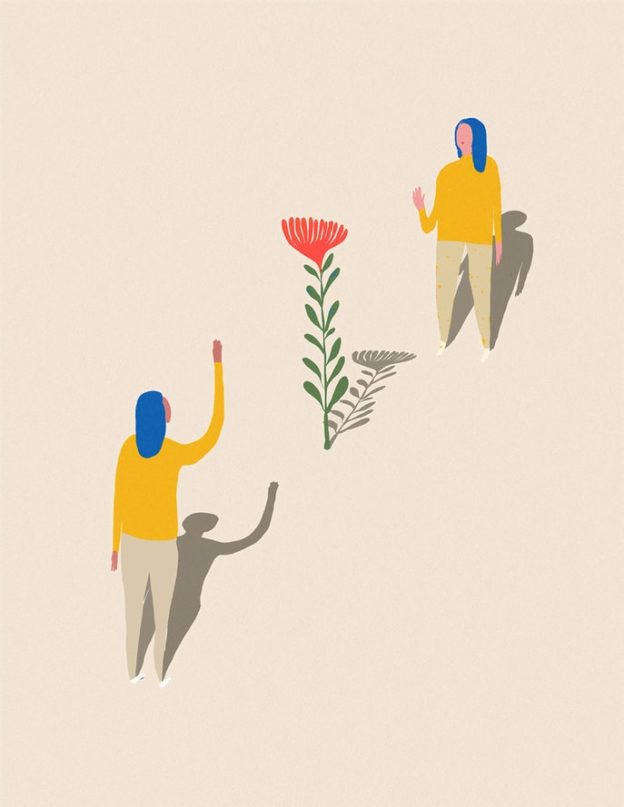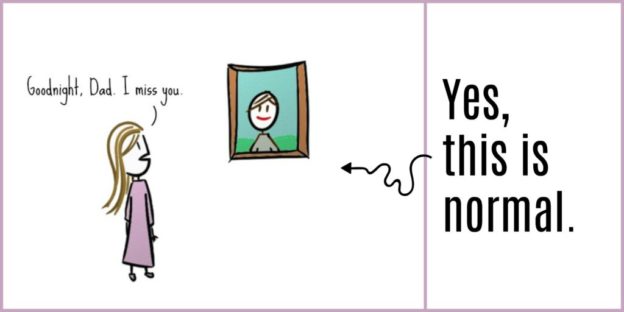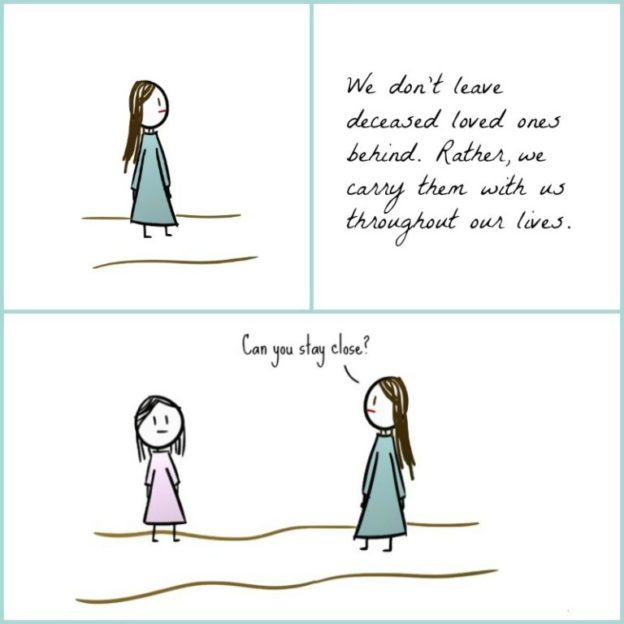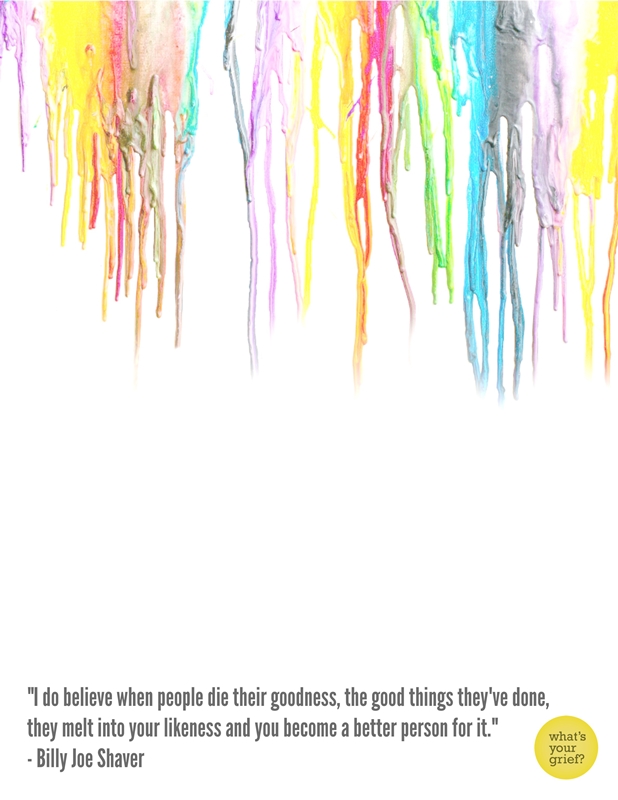5 Common Grief Myths Busted By Grief Experts
October 19th, 2020
Grief is something not many people understand, yet everyone experiences.
And the way we grieve is changing, quickly. It seems that the old paradigm was seeing grief as a more linear process. And now, in the new paradigm, we’re starting to understand grief a little differently.
Some of my favorite schools of thought on grief stem from the Continuing Bonds
(CB) theory, which addresses many of the problematic aspects of other schools of thought around grief (you can read more about it here if you’re not familiar).
Reading about CB theory inspired me to address some of the greatest myths out there about grief, and shine some light on them. Wanna join me? Let’s keep reading below.
Grief Myth #1
Myth: The journey of grief eventually brings you to closure.
Reality: The journey of grief is non-linear. There is no “end” to grief; grief is ongoing.
Many of the theories that describe grief and its stages, including the 5 stages of grief allude to some point where there is “closure”. Let’s just go ahead and knock that myth out of the park right now, so we can all let out a deep sigh in relief.
First of all, grief is ongoing. It never ends. According to Eleanor Haley from What’s Your Grief, “Grief isn’t something you go through, it’s something that becomes a part of you. It’s forever.” Beautiful, and relieving, isn’t it? Secondly, there is no such thing as closure. We never truly “close the book” on our loved ones. It’s always with us, and we can smell the pages, read them again and again, and enjoy the book. Because it will always remain in our hearts.
Speaking of closure, let’s move on the next myth…
Grief Myth #2
Myth: We must eventually “move on” from the loss of a loved one.
Reality: It’s not necessary to “detach” from your grief, and it’s perfectly safe to have your grief.
Imagine a scene in a Rom-Com movie where a widow can’t seem to “start a new life” after the loss of a spouse. So the scene shows you him feeling depressed and eating ice cream in sweatpants on his couch watching The Golden Girls.
You can imagine this classic scene being followed up with a seemingly supportive friend busting into his dirty home and shouting “C’mon man, you’ve got to move on!”

It’s all too often that we feel pressured in modern society to move on from a loss when in reality, we’re not ready to yet. Now, this isn’t to condone sitting in a dirty house with a tub of ice cream for years on your couch. But according to the CB theory, we never actually detach from the ones we’ve lost… we still connect to them throughout our lives. And, there is no pressure to leave them behind.
However, it’s important to recognize that the way we relate to our loved ones changes over time. What once felt like an empty hole of sadness, after 10 years, could feel like a gentle loving warmth in your heart. Your grief changes throughout the years. There’s no need to avoid it like the plague, or wish it away. It doesn’t always have to be painful. And it won’t always be. But it always will be.
Grief Myth #3
Myth: Staying connected to your loved one after their passing makes you a little crazy
Reality: Continuing a long-lasting connection to the deceased is necessary and healthy
Connecting with our lost loved ones has been portrayed in the media as being creepy, eerie, and sometimes downright crazy. Only insane people would do that, right? Not so fast.
Many cultures around the world see connecting to their loved one through rituals, conversations, songs and even keepsakes as sacred, healing, and incredibly helpful to help ease the pain of the loss. In fact, modern psychology tells us that rituals around our deceased loved ones are one of the only things that makes death bearable for us to process. In fact, CB research says that “remaining connected seemed to facilitate the bereaved’s ability to cope with loss and accompanying changes in their lives”. So enough with the stigma!

Source: What’s Your Grief
Grief Myth #4
Myth: Remembering a lost loved one means staying in the past
Reality: Remembering a lost loved one can mean connecting them to new experiences in your life
It can be so easy to think that the only way you can remain connected to your loved one is to remember the times you spent with them. But CB theory explains that our relationship with our passed loved ones is not meant to be static. In fact, according to the CB theory: “Instead [of a static relationship], they evolve and mature right along with us”. This just goes to show that a healthy way of grieving someone, may be inviting their presence into new experiences you have. Especially those they would have loved to experience themselves, but never got to.

Source: What’s Your Grief
Grief Myth #5
Myth: When someone we love passes on, we have lost them
Reality: When someone we love passes on, their wisdom and goodness lives on through us
I’m sure you’ve heard the saying “sorry for your loss” many times before. While there’s nothing wrong with this saying per se, I don’t necessarily believe we ever truly lose someone. How can we “lose” someone who we keep so dearly in our hearts? Their physical presence may no longer be, but their wisdom, their jokes, their goodness lives on through us, or as Billy Joe Shaver says, it “melts” into us.
It’s a really healing practice to write down all of the beautiful soul notes that have “melted” into you thanks to your loved one. If you’re interested in trying this exercise, here’s a PDF journal prompt from What’s Your Grief.

Source: What’s Your Grief
What other grief myths should be busted? Tell us about them in the comments below!
Also Read: If you’re looking for a platform that helps your families heal through all aspects of their grief, check out our e-aftercare platform with 365 days of daily healing email affirmations, an online grief counselor on-demand, and the technology to hold online grief support groups, all from your funeral home website. To learn more, visit our website here.


Thank you for this excellent article!
I have been a professional grief mentor for almost forty years. I have identified at least 20 common falsehoods/fallacies/flat out lies about grief and grieving widely taught and widely believed in our death-denying, pain avoidant culture. I am in the process of completing a manuscript tentatively titled, “The Hopeful Helpful Truth About Grief.” In this book I am addressing these common misunderstandings and offer clarification and gentle guidance.
Again, thank you for your updated, enlightened information. We all have to work together to upgrade our community’s understanding of this universal human experience.
Thank you for condensing what I have been teaching my clients. There is no moving on, but there can be moving forward. Grief isn’t a straight, or even a curved, path. It goes up and down, inside and out. It doubles back on itself. It feels like time has stopped. It feels like time has sped up.
The most basic truth about grief is that it is different for each person. It’s also true that everyone feels the same things, just in a different way.